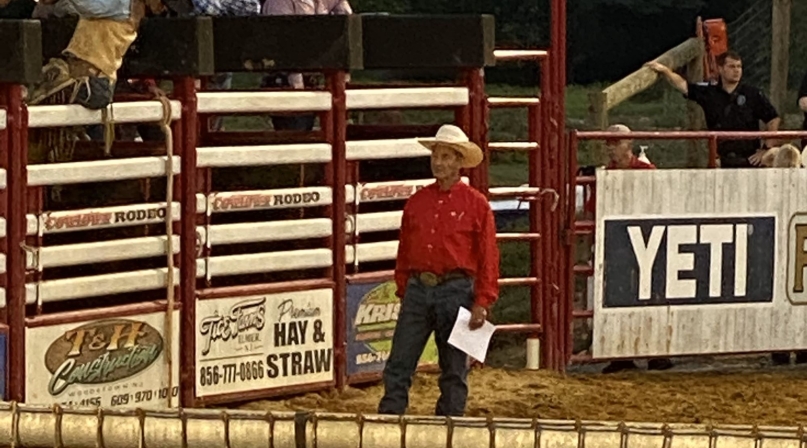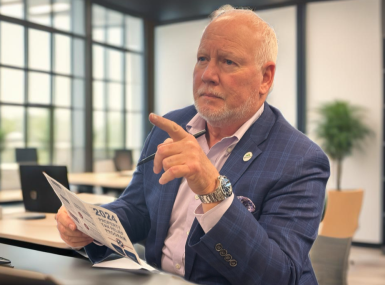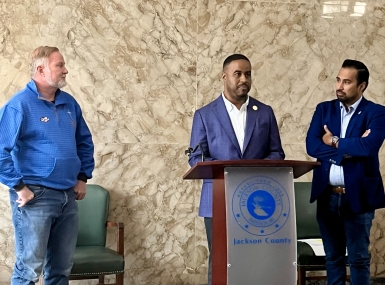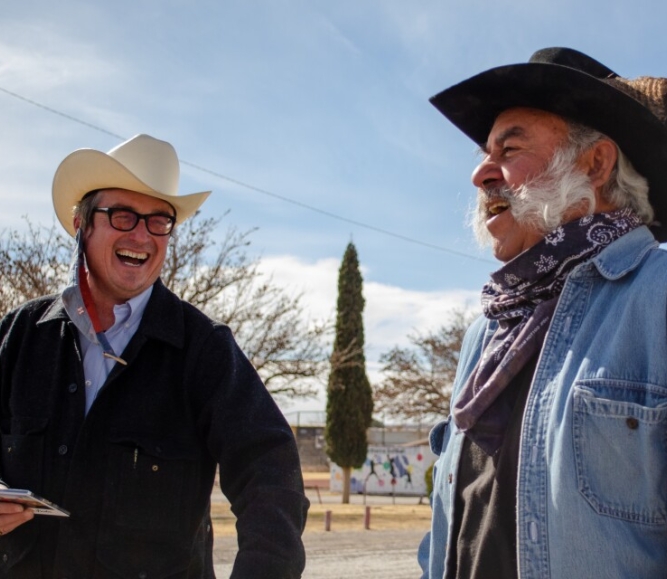Tall in the saddle: Commissioner moonlights at Saturday rodeo

It’s a Saturday night in Salem County, N.J., which means everyone is at the Cowtown Rodeo.
“When you think about tourism and recreation in Salem County, number one is Cowtown Rodeo, and number two is Cowtown Rodeo,” said Mickey Ostrum. “This is it. This is what you do here.”
Another rider gets bucked off a bull — tonight’s been one of those nights — and Ostrum has the perfect song to capture the energy in the stadium. Cheers and whoops echo throughout Cowtown as Queen blares over the loudspeakers:
“Another one bites the dust / Another one bites the dust. And another one gone, and another one gone / Another one bites the dust (yeah).”
Every other Wednesday at 6 p.m., Mickey Ostrum puts on his commissioner “hat,” where he deals with everything in Salem County, N.J. from agriculture and public safety to education and social services. But on Saturdays at 6 p.m., he puts on his cowboy hat and gears up for Cowtown Rodeo.
Cowtown Rodeo, the longest-running weekly rodeo in the country, is the backdrop of Ostrum’s life: “It’s my love,” he said. “I grew up right here. Actually, that’s not true — nobody grows up in Cowtown,” he added with a laugh.
Ostrum’s father was close friends with the owner of Cowtown, and by the age of 5, Ostrum was spending his free time at the rodeo, “rolling around on the ground and playing tag.” Roughhousing around the rodeo soon turned into feeding and branding the cattle and learning how to rope and ride. And in high school, vacations meant taking the rodeo on the road to Madison Square Garden and up through New England.
In the 1970s, Ostrum fell into the role of Cowtown Rodeo announcer — one he would have for roughly a decade, he said. The previous announcer “decided to move to Texas, and [the owner] thought that, I guess, I had a big mouth,” he joked. Rodeo announcing has evolved a lot since Ostrum’s days behind the microphone, he said.
“If you’ve ever seen any sports broadcast from back in the old days, it was much drier, like, ‘OK, running back’s got the ball, he hits the tackle, and he’s down,’” Ostrum said. “Now, these guys are doing so much analysis and just putting more emotion into it. It’s been a changing industry, and that has hit rodeo as well.”
In July 1978, The New York Times published an article, “Saturday Night Is Rodeo Night - Deep in the Heart of New Jersey,” about Cowtown.
“For spectators unfamiliar with the event, announcer Mickey Ostrum (a second-year resident in obstetrics in Wilmington who likes to say that he’s delivered more calves than babies) did a lucid job of explaining the fine points,” the article reads. “He also mentioned that the riders’ spurs are not pointed, and that the leather flank straps used to make the animals kick higher are wool‐padded and cause annoyance but not pain.”
Ostrum was an announcer at Cowtown throughout his medical residency and during his early years as an obstetrician, but stepped back when things picked up at his practice, he said. However, he never left Cowtown, spending his free time working livestock and helping out around the arena. And he raised his son Jake around the rodeo, just as he had been. Now, Jake is Cowtown’s musical director and Ostrum takes over several times a season.
“When he’s out West, I’m spinning tunes at the rodeo,” Ostrum said. “But I always laugh, I call myself the ‘Chief Medical Officer of Cowtown Rodeo.’” The father-son duo have different styles when it comes to rodeo music, Ostrum said. “Although, he certainly got a lot of his musical taste from me,” he adds.
The elder Ostrum gravitates toward classic rock and country — the kinds of songs he would hear playing at the rodeo back when it had a live band, he said.
“And I do some sing-alongs — everybody knows ‘Don’t Stop Believin,’ ‘Sweet Caroline,’ ‘Friends in Low Places,’” Ostrum said. “When action drags a little bit, you come up with a sing-along to bring the crowd back into it. And I try to find something that is applicable to what’s going on in the rodeos, sometimes you get a chuckle out of that.”
Tom Petty’s “Free Fallin” is a crowd favorite after a rider’s been bucked off, along with “Another One Bites the Dust,” Ostrum said. Rodeo competitions have, on the whole, become much more of a production than they were when Ostrum was growing up. Rodeos are on streaming services and network television, and people tune in to be entertained, he said.
The crowd is there to have a good time, Ostrum said. “If there happens to be a good rodeo, that’s a plus, but they’re just there to listen to music and dance and rock and roll in the stand. And the announcer gauges that and encourages it — it’s much more proactive than it used to be.”
While rodeo has become more readily available to the mainstream in recent years, Cowtown has been airing its competitions on network television since the weekly rodeo started in 1955, which Ostrum attributes to some of its longevity.
“In ’55, going on network TV, it was very avant-garde,” Ostrum said. “The rest of the rodeo establishment was [saying], ‘Why are you giving it away when you want to sell tickets?’ But obviously they were very short-sighted.”
Today, Cowtown’s doing better than ever. Coming out of the pandemic, ticket sales in summer 2021 were 50% higher than they had ever been. Long-time lovers of Cowtown were eager to return, and it attracted a whole new group of people who had never been to a rodeo before.
“It’s been embraced,” Ostrum said. “The crowds are better than they’ve ever been, I think in part due to Covid, because it’s an outdoor venue and people discovered it and fell in love with it and keep coming.”
Ostrum’s 2-year-old grandson recently got on a horse for the first time, and the family’s ties to Cowtown now go back four generations. While many things change, it’s nice that the slow pace of life in Salem County (the least populous county in New Jersey) and Cowtown Rodeo have largely stayed the same, Ostrum said.
“We’re blessed to live in an area that, in many ways, hasn’t changed for the 60 years that I’ve lived here,” Ostrum said. “The pastures are still open, and as long as I don’t look in certain directions, it looks exactly like it did when I was a kid, and that’s a good thing.”
Ostrum splits his time now between Cowtown and county board meetings, but he’ll never give up the rodeo.
“It’s my roots,” he said. As a Salem County commissioner, Ostrum said he doesn’t see himself as a politician, but as someone who’s trying to do the best for all of his neighbors. He brings the work ethic and honesty that is “central” to rodeo and cattle wrangling into his public service, he said.
“I’m learning a lot and it’s stimulating,” Ostrum said. “You know, the worst thing you can do is ride off into the sunset, fall asleep and fall off of your horse.”
Related News

Now I know to remember why I’m there
When David Copeland won a seat on the Tipton County, Tenn. Commission, he made it a point to increase outreach to his district in hopes of engaging his constituents.

Jackson County chair combines diverse experiences for effective leadership
A fellowship funded by the Congressional Black Caucus kick-started DaRon McGee’s career in public service, but his promise to his mother brought him back to Jackson County, Mo., where he's made his name.

Accepting criticism can help improve results, Howard County executive says
Calvin Ball recognizes that any election results show elected officials probably don’t have universal approval, and winning over critics can lead to better overall communication with all residents.
News
‘Singing cowboy’ commissioner connects with Texas constituents
Presidio County, Texas Commissioner David Beebe connects with residents through music — both his own performances and DJing his own radio show “Night Train Express.”

